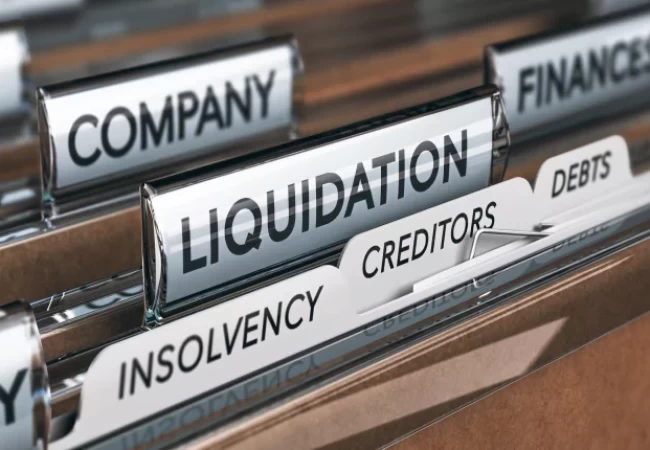

The UAE requires you to cancel your business license and all associated permits after you have decided to close your business. This is to avoid accumulating fines when a license does not renew upon its expiration date. It is important to let relevant government entities know that you have left the company. In a shareholding company, it's critical to release your obligations to partners and creditors while safeguarding your shares and interests. Since you are not familiar with the liquidation procedures, seek help from leading auditing and business consulting firms in the UAE. Expert liquidators can provide hassle-free service. In this blog, we will be discussing the types of company liquidation and steps for closing a business on the mainland.
A business liquidation service in the UAE is the procedure followed when a company decides to stop all of its business operations. When it is decided that a company's services cannot be maintained, the business must close. There are several potential causes for this.
Companies can go bankrupt if their obligations outweigh their assets. If the company fails to operate, it needs to be closed. If a company's management decides to shut it down for reasons they are aware of, liquidation may also be optional. If any assets are left over after all of the company's liabilities have been paid, they are sold, and the profits are distributed among the directors and shareholders of the company.
Voluntary liquidation refers to the closing down of a business after the shareholders have approved it. Such a decision will be made when the entrepreneur decides it is pointless for the business to continue operating.
In order to receive their money if a company's debts are not properly paid, creditors may ask the courts to dissolve the business. The courts have the authority to order a company to liquidate and sell its assets in order to pay off outstanding debts. In the event of a mandatory liquidation, a liquidator may be chosen by the courts or by the shareholders.
Representing the company in court.
They are responsible for representing the corporation in court and paying its debts. Unless otherwise mentioned in their appointment instrument, the liquidator sells the company's moveable or real estate at a public auction or through any other manner. They may even sell the entire company's assets without obtaining consent from partners or the general assembly.
Inventory of company assets and debts
A list of all the company's assets and obligations is prepared by the liquidator when a business enters liquidation. The managers or chairman of the board of directors must grant the liquidator access to all of the company's assets, accounts, books, and records in order to accomplish this. With this inventory, the liquidator will be able to decide how to divide the company's assets and pay off its obligations.
Compiling a list of the company's finances and obligations
A thorough list of the company's assets and liabilities is produced by the liquidators in Dubai throughout the liquidation process. This list, which contains a budget, needs to be signed by the chairman of the board of directors or the managers of the business. All of the liquidation work is documented in a book that the liquidator keeps.
Notifying creditors during company liquidation
The liquidator must notify all creditors of the company in writing about the liquidation process and encourage them to make claims. The announcement shall be published in two local newspapers, one in Arabic and one in English, with a minimum 45-day grace period for creditors to file claims. Once the debts have been addressed, the liquidator will notify the creditors.
Representing the company
In company liquidation, a liquidator is in charge of representing the firm in court and paying its debts. Unless otherwise specified in their appointment paperwork, they may sell the company's assets at a public auction or by other means. The liquidator can even sell the entire company's assets without the agreement of the partners or the general assembly. Their responsibilities also include compiling a list of the company's assets and liabilities, as well as keeping a book of the liquidation proceedings.
Fulfilling firm debts during liquidation.
During company liquidation, the liquidator must repay the debts with the business's available funds. If there is insufficient funds to cover all debts, the liquidator must pay a portion of them while protecting the interests of privileged creditors. Any debt incurred during the liquidation process should be prioritized over other debts and paid with company funds.
The Dubai government has stated that many types of papers are required for the liquidation process. In Dubai, the following documents are required for company liquidation:
Depending on how your firm is set up, the license may be cancelled. If you're an establishment or sole proprietorship, you should complete the cancellation process through the DED and acquire all the necessary clearances from:
A company with shares must liquidate its shares, collect the debts, and pay its creditors before finalizing with DED.
Stage 1
Stage 2
Now, you may have understood that liquidation is not an easy process. As one of the best company liquidators in the UAE, we, Reyson Badger, can help you with the liquidation process of your company. Reyson Badger has years of experience in company liquidation, and we can make the procedure smooth and hassle-free for you. If you are on the lookout for company liquidation services, get in touch with us.